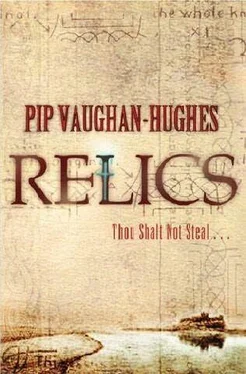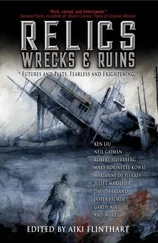Pip Vaughan-Hughes - Relics
Здесь есть возможность читать онлайн «Pip Vaughan-Hughes - Relics» весь текст электронной книги совершенно бесплатно (целиком полную версию без сокращений). В некоторых случаях можно слушать аудио, скачать через торрент в формате fb2 и присутствует краткое содержание. Жанр: Исторический детектив, на английском языке. Описание произведения, (предисловие) а так же отзывы посетителей доступны на портале библиотеки ЛибКат.
- Название:Relics
- Автор:
- Жанр:
- Год:неизвестен
- ISBN:нет данных
- Рейтинг книги:4 / 5. Голосов: 1
-
Избранное:Добавить в избранное
- Отзывы:
-
Ваша оценка:
- 80
- 1
- 2
- 3
- 4
- 5
Relics: краткое содержание, описание и аннотация
Предлагаем к чтению аннотацию, описание, краткое содержание или предисловие (зависит от того, что написал сам автор книги «Relics»). Если вы не нашли необходимую информацию о книге — напишите в комментариях, мы постараемся отыскать её.
Relics — читать онлайн бесплатно полную книгу (весь текст) целиком
Ниже представлен текст книги, разбитый по страницам. Система сохранения места последней прочитанной страницы, позволяет с удобством читать онлайн бесплатно книгу «Relics», без необходимости каждый раз заново искать на чём Вы остановились. Поставьте закладку, и сможете в любой момент перейти на страницу, на которой закончили чтение.
Интервал:
Закладка:
I tried to think above the waves of misery flowing from my wound. 'No,' I said at last. 'No. Truly it does not.'
'I am glad – truly. But whatever your feelings, you are safe with us. I will put you ashore in some safe port, if you wish. That has always been my intention. Or…'
The thought of the world beyond the Cormaran filled me with sudden dread. Dry land – it looked so peaceful, drifting far off in a haze of blue and purple, but it held only death for me now. Then I patted Thorn where she lay against my tunic. I was safe out here on the sea, in this strange company that seemed to have adopted me. Laying my good hand on the smooth wood of the tiller, I followed Nizam's gaze to the far horizon, where sky and ocean met in a perfect silver line. 'I wish to stay,' I said.
Chapter Eleven
North and north we sailed, until I was sure we would brest the top of the world and fall down the other side into oblivion. But then we reached the Faroe Isles, and I wondered whether we had not already sailed out of the familiar world. This place of looming cliffs and smooth green grass was unearthly. Myriad seabirds wheeled and shrieked about the crags, and waves boomed and rang in the caves below. The beaches were desolate, and the inhabitants avoided us, although we passed one of their villages, the low houses thatched with living turf so that the place looked like nothing so much as a colony of ant-hills. There seemed to be as many sheep as seabirds. White shapes against the blue sky above, and the green grass below.
We put in to a sheltered cove on a little island to take on water. My wound having healed in the salt air and Isaac's bastings, I went ashore in the long-boat with the watering party, and after the casks were filled at a little stream that ran clear as diamonds down to the sea, I wandered among the tussocky grass for a while, marvelling at the odd birds that squatted and scurried about everywhere on bright red feet, creatures the size of ducks with grotesque wedge-shaped beaks that seemed to bear all the colours of the rainbow. In the air they whizzed about like crossbow bolts. 'Puffins,' Horst called them. 'Funny, are they not? You will be cursing them before long.' I wondered what he meant: the stubby, self-important creatures looked good-natured and harmless. I stored Horst's remark away in the overflowing sea-chest of my mind with all the other odd lore I had heard on board. 'Ask about puffins,' I told myself. A shout came from the long-boat: time to be off. I forgot all about birds as I ran back down to the shore, horrified at the prospect of being marooned in this desolate place.
We put in for half a day at Torshavn, a little town of turf-roofed houses that Nizam told me was the most important place hereabouts. Tough, salt-wizened men with bleached out hair and eyes unloaded a few dark bales from our hold, and loaded on a few more casks and bottles, some bundles of sealskins, and many sacks of wool. The Captain went ashore, and I saw him deep in conversation with a small but important-looking islander. They nodded back and forth, then the Captain roared with laughter while the other grinned gap-toothed at him. They embraced, and the Captain strolled back to the ship.
'These are good people,' he told me later. We were standing on the bridge, the Captain, Nizam, Gilles and myself, watching Torshavn dwindle to a blur behind us. 'Sheep and whales are all they know, but although they are farmers, they have pirate blood in their veins.'
They look as tough as old ox-hide,' I said. 'I would not live there, not for all the spices of India.'
Gilles grunted pleasantly. 'It is lucky you did not wish to be put ashore in a safe port, Master Petroc,' he said. 'I can think of no safer port than Torshavn.'
What did we take on board?' I asked, to change the subject. 'I saw woolsacks.'
We trade wool for skins,' answered the Captain. 'Bear, wolf, simple stuff. The fur is as welcome as gold, and we will trade the wool in Greenland.'
'And where do we sail now? To Iceland?' I shivered. Further north, towards the abyss. I could feel the loneliness of the islands with me still, as if it lingered around the ship like mist. I dreaded to think what awaited us next. 'Aye. We'll stop for water and provisions, but no trade, I think, this trip. Sturri – the man I was talking to, a councillor -warned us off. King Haakon has men in Reykjavik, to smother unlawful business. A shame. You would like the Icelanders. Odd folk, but friendly. They are all related to each other, you see. Vikings, every one.' And the Greenlanders?'
You will see for yourself. A sad place, too near the world's edge for people to settle comfortably. In times past it was safe and green, but this age of the world is turning cold, and they freeze, little by little, year by year. It is… you will see.'
With that, the subject was closed, and we stood quietly and watched the petrels skim our wake as the islands dropped below the edge of the world. The horizon was wide and desolate, and the water was fretful. Away ahead of us, sea and sky merged in a dark green haze. Nizam hunched his shoulders for an instant, as if settling a heavy load upon his back. 'The Sea of Darkness,' he murmured.
A steady south wind eased our crossing to Iceland, although the sea was black and troubled, and we were followed by dark sea birds that swooped and scudded across our wake. Leagues and leagues from any shore they wandered, never alighting, not even on our masts, which to me seemed incredible; but these creatures were wedded to the air as men are bound to the land: even on the oceans we create little landscapes of wood on which we can firmly set our feet. When I was not working -and I now had my share of chores with the rest of the crew – I would climb to the bridge and stand with Nizam, looking out at the little birds that were so close and yet so unknowable.
Iceland appeared as a stern grey line one late afternoon. We found landfall at Hofn, a small port on the south-eastern coast, a dour place that huddled on a flat shore behind which mountains rose and beyond them, so the Captain told me, the great ice-fields of Vatnajokull spread out in a frigid hell, many days travel of desolation in any direction. As in the Faroes, some business was conducted on the wharfside, and we carried many small but heavy barrels aboard. As the Captain had said, we did no trade, but he and Gilles spent half a day in conference with some of the town's important men. We took to sea again, stopped for water and set a western course.
The southern wind blew for a week or so longer, and we skipped and rolled crosswise over a steady swell, although I began to notice a deeper mood in the motion of the ship, a faint, almost imperceptible roll at odds with the action of the waves. I asked Nizam, who had become my oracle in all things relating to the sea and the ship, about it.
'It is the swell of the deep ocean,' he told me. 'Though the winds shift all about the compass, yet steadily all weather comes from the world's edge in the far west, and always the oceans feel it and are driven by it – perhaps there are great storms far, far away that whip the seas into mountains of water, and this swell is a faint memory of that. No one knows, but I have heard that on the western shores of Ireland the waves can top the highest cliffs, and that after a great storm sea monsters have been dragged up out of the abyss and thrown onto the beaches. We had an Irishman aboard for a while – Colm, his name was – who swore he had seen such a creature. A great pale serpent bigger than a forest tree and as thick around; when he approached, it yelped at him in a language he did not understand and writhed away back to the water.'
This was not likely to comfort someone new to the life of a deep-water sailor. My dreams became invaded by writhing tangles of colossal serpents that seethed far below me like the eels that I had seen in the river at Balecester, feasting in the shallows on dead cats and dogs.
Читать дальшеИнтервал:
Закладка:
Похожие книги на «Relics»
Представляем Вашему вниманию похожие книги на «Relics» списком для выбора. Мы отобрали схожую по названию и смыслу литературу в надежде предоставить читателям больше вариантов отыскать новые, интересные, ещё непрочитанные произведения.
Обсуждение, отзывы о книге «Relics» и просто собственные мнения читателей. Оставьте ваши комментарии, напишите, что Вы думаете о произведении, его смысле или главных героях. Укажите что конкретно понравилось, а что нет, и почему Вы так считаете.












